Unit 2 Neighbours 同步学案(知识点讲解+单元测试题)
文档属性
| 名称 | Unit 2 Neighbours 同步学案(知识点讲解+单元测试题) | 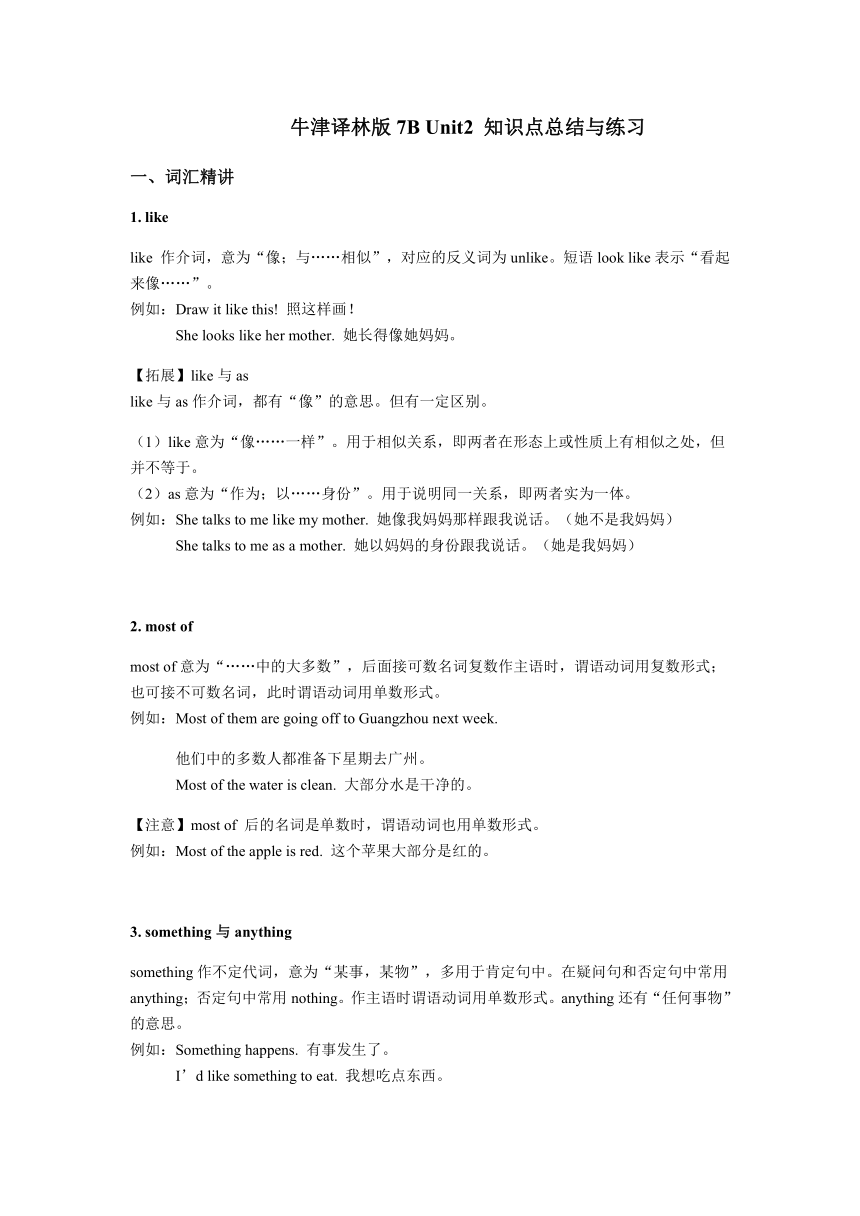 | |
| 格式 | zip | ||
| 文件大小 | 55.5KB | ||
| 资源类型 | 教案 | ||
| 版本资源 | 牛津译林版 | ||
| 科目 | 英语 | ||
| 更新时间 | 2020-01-20 14:36:59 | ||
图片预览

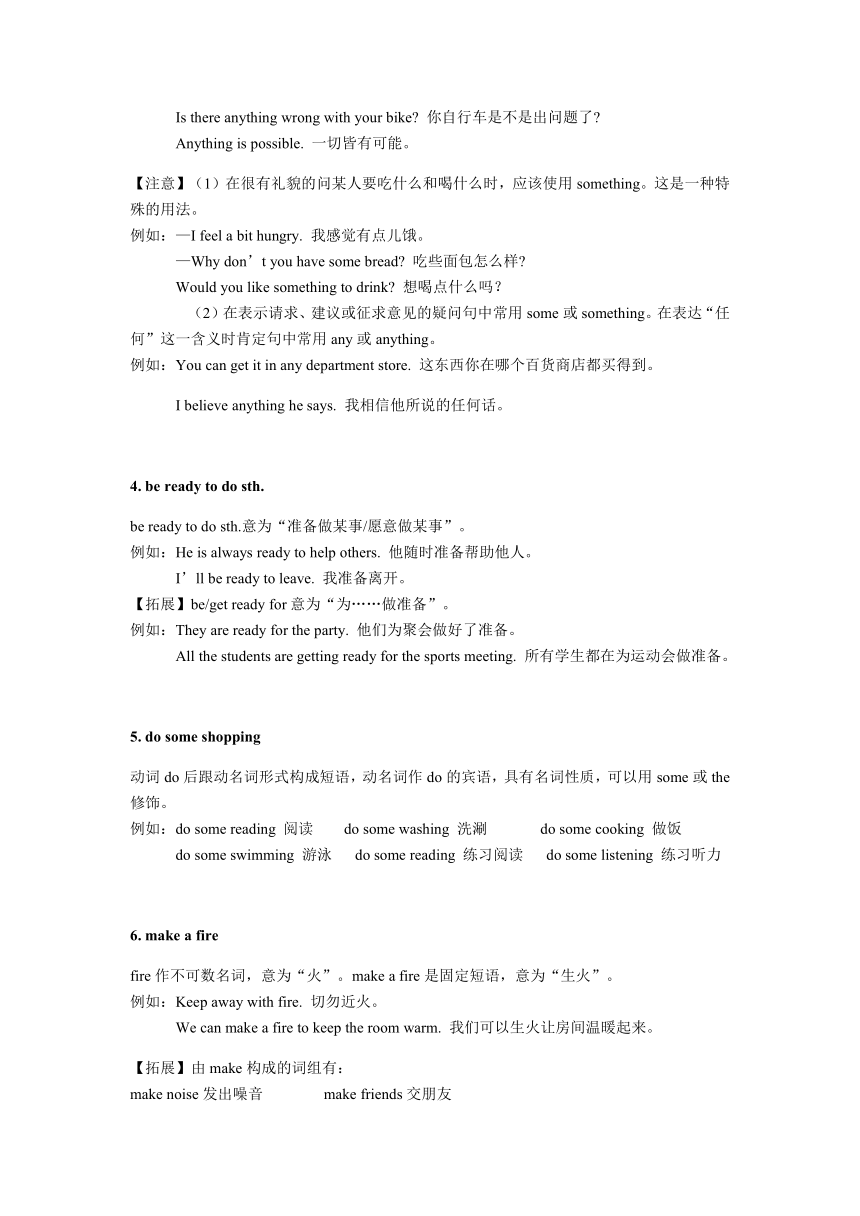
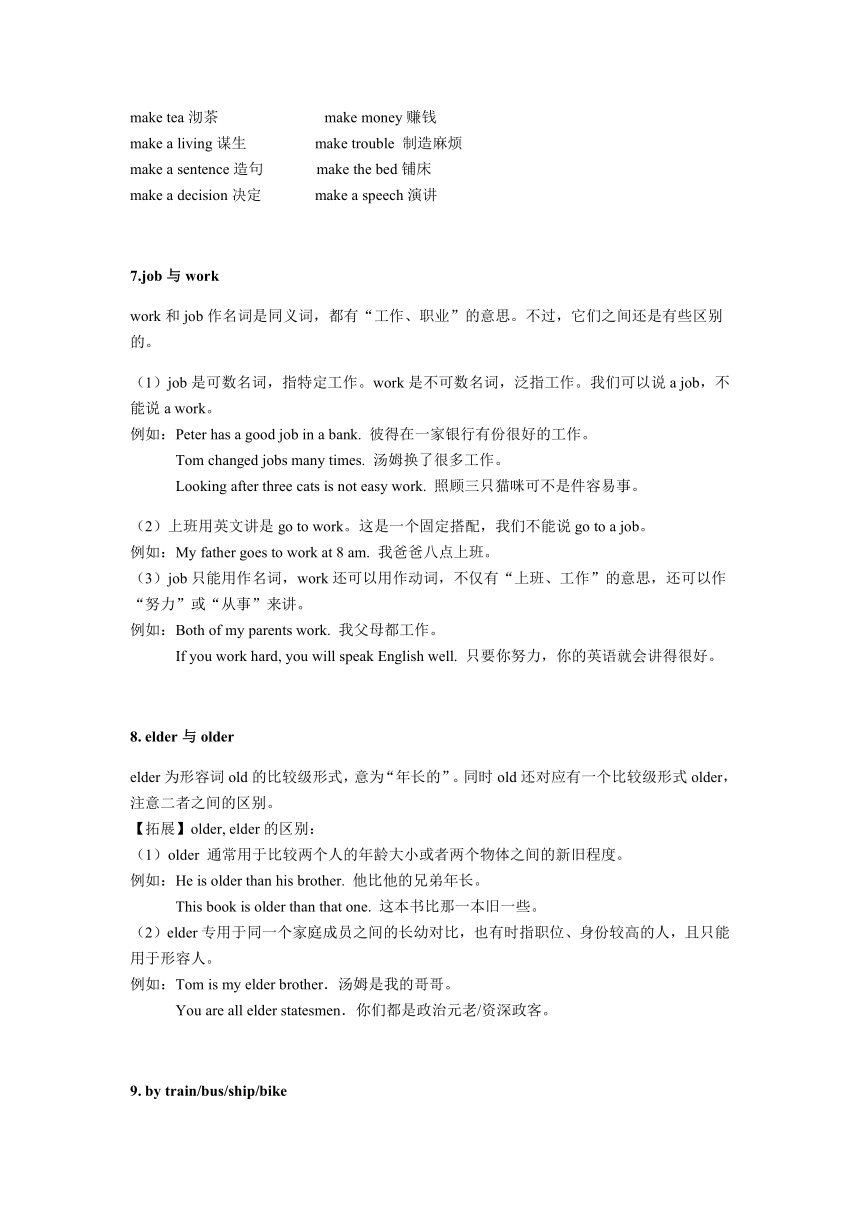
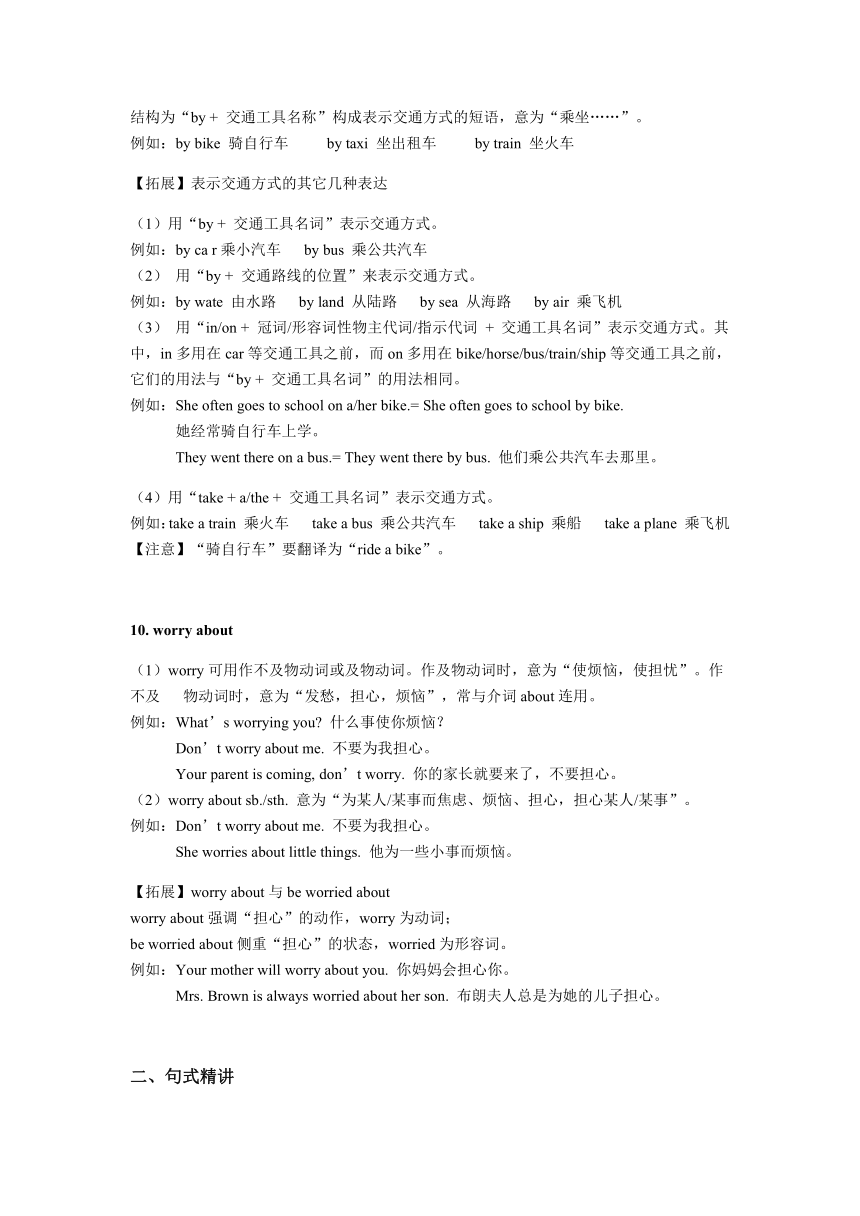
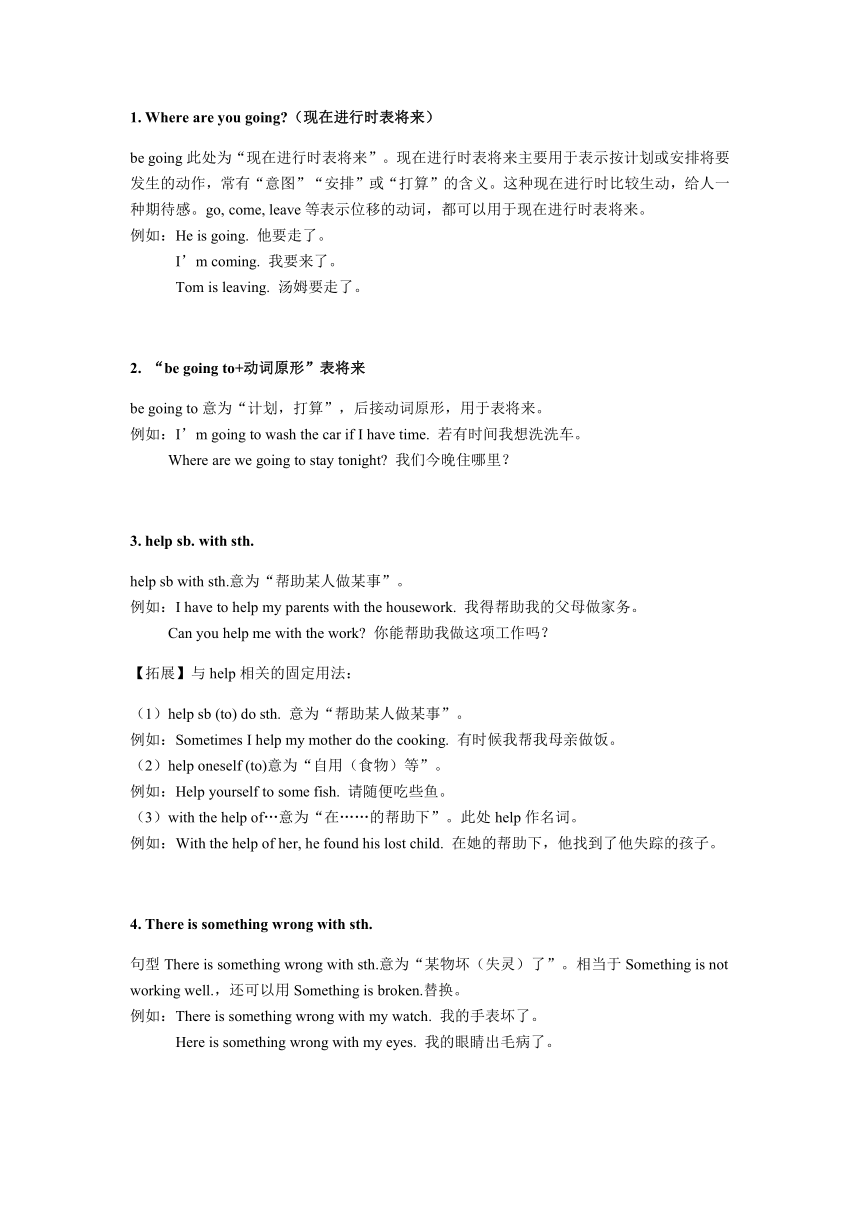
文档简介
牛津译林版7B Unit2 知识点总结与练习
一、词汇精讲
1. like
like 作介词,意为“像;与……相似”,对应的反义词为unlike。短语look like表示“看起来像……”。
例如:Draw it like this! 照这样画!
She looks like her mother. 她长得像她妈妈。
【拓展】like与as
like与as作介词,都有“像”的意思。但有一定区别。
(1)like意为“像……一样”。用于相似关系,即两者在形态上或性质上有相似之处,但并不等于。
(2)as意为“作为;以……身份”。用于说明同一关系,即两者实为一体。
例如:She talks to me like my mother. 她像我妈妈那样跟我说话。(她不是我妈妈)
She talks to me as a mother. 她以妈妈的身份跟我说话。(她是我妈妈)
2. most of
most of意为“……中的大多数”,后面接可数名词复数作主语时,谓语动词用复数形式;也可接不可数名词,此时谓语动词用单数形式。
例如:Most of them are going off to Guangzhou next week.
他们中的多数人都准备下星期去广州。
Most of the water is clean. 大部分水是干净的。
【注意】most of 后的名词是单数时,谓语动词也用单数形式。
例如:Most of the apple is red. 这个苹果大部分是红的。
3. something与anything
something作不定代词,意为“某事,某物”,多用于肯定句中。在疑问句和否定句中常用anything;否定句中常用nothing。作主语时谓语动词用单数形式。anything还有“任何事物”的意思。
例如:Something happens. 有事发生了。
I’d like something to eat. 我想吃点东西。
Is there anything wrong with your bike? 你自行车是不是出问题了?
Anything is possible. 一切皆有可能。
【注意】(1)在很有礼貌的问某人要吃什么和喝什么时,应该使用something。这是一种特殊的用法。
例如:—I feel a bit hungry. 我感觉有点儿饿。
—Why don’t you have some bread? 吃些面包怎么样?
Would you like something to drink? 想喝点什么吗?
(2)在表示请求、建议或征求意见的疑问句中常用some或something。在表达“任何”这一含义时肯定句中常用any或anything。
例如:You can get it in any department store. 这东西你在哪个百货商店都买得到。
I believe anything he says. 我相信他所说的任何话。
4. be ready to do sth.
be ready to do sth.意为“准备做某事/愿意做某事”。
例如:He is always ready to help others. 他随时准备帮助他人。
I’ll be ready to leave. 我准备离开。
【拓展】be/get ready for意为“为……做准备”。
例如:They are ready for the party. 他们为聚会做好了准备。
All the students are getting ready for the sports meeting. 所有学生都在为运动会做准备。
5. do some shopping
动词do后跟动名词形式构成短语,动名词作do的宾语,具有名词性质,可以用some或the 修饰。
例如:do some reading 阅读 do some washing 洗涮 do some cooking 做饭
do some swimming 游泳 do some reading 练习阅读 do some listening 练习听力
6. make a fire
fire作不可数名词,意为“火”。make a fire是固定短语,意为“生火”。
例如:Keep away with fire. 切勿近火。
We can make a fire to keep the room warm. 我们可以生火让房间温暖起来。
【拓展】由make构成的词组有:
make noise发出噪音 make friends交朋友
make tea沏茶 make money赚钱
make a living谋生 make trouble 制造麻烦
make a sentence造句 make the bed铺床
make a decision决定 make a speech演讲
7.job与work
work和job作名词是同义词,都有“工作、职业”的意思。不过,它们之间还是有些区别的。
(1)job是可数名词,指特定工作。work是不可数名词,泛指工作。我们可以说a job,不能说a work。
例如:Peter has a good job in a bank. 彼得在一家银行有份很好的工作。
Tom changed jobs many times. 汤姆换了很多工作。
Looking after three cats is not easy work. 照顾三只猫咪可不是件容易事。
(2)上班用英文讲是go to work。这是一个固定搭配,我们不能说go to a job。
例如:My father goes to work at 8 am. 我爸爸八点上班。
(3)job只能用作名词,work还可以用作动词,不仅有“上班、工作”的意思,还可以作“努力”或“从事”来讲。
例如:Both of my parents work. 我父母都工作。
If you work hard, you will speak English well. 只要你努力,你的英语就会讲得很好。
8. elder与older
elder为形容词old的比较级形式,意为“年长的”。同时old还对应有一个比较级形式older,注意二者之间的区别。
【拓展】older, elder的区别:
(1)older 通常用于比较两个人的年龄大小或者两个物体之间的新旧程度。
例如:He is older than his brother. 他比他的兄弟年长。
This book is older than that one. 这本书比那一本旧一些。
(2)elder专用于同一个家庭成员之间的长幼对比,也有时指职位、身份较高的人,且只能用于形容人。
例如:Tom is my elder brother.汤姆是我的哥哥。
You are all elder statesmen.你们都是政治元老/资深政客。
9. by train/bus/ship/bike
结构为“by + 交通工具名称”构成表示交通方式的短语,意为“乘坐……”。
例如:by bike 骑自行车 by taxi 坐出租车 by train 坐火车
【拓展】表示交通方式的其它几种表达
(1)用“by + 交通工具名词”表示交通方式。
例如:by ca r乘小汽车 by bus 乘公共汽车
(2) 用“by + 交通路线的位置”来表示交通方式。
例如:by wate 由水路 by land 从陆路 by sea 从海路 by air 乘飞机
(3) 用“in/on + 冠词/形容词性物主代词/指示代词 + 交通工具名词”表示交通方式。其中,in多用在car等交通工具之前,而on多用在bike/horse/bus/train/ship等交通工具之前,它们的用法与“by + 交通工具名词”的用法相同。
例如:She often goes to school on a/her bike.= She often goes to school by bike.
她经常骑自行车上学。
They went there on a bus.= They went there by bus. 他们乘公共汽车去那里。
(4)用“take + a/the + 交通工具名词”表示交通方式。
例如:take a train 乘火车 take a bus 乘公共汽车 take a ship 乘船 take a plane 乘飞机
【注意】“骑自行车”要翻译为“ride a bike”。
10. worry about
(1)worry可用作不及物动词或及物动词。作及物动词时,意为“使烦恼,使担忧”。作不及 物动词时,意为“发愁,担心,烦恼”,常与介词about连用。
例如:What’s worrying you? 什么事使你烦恼?
Don’t worry about me. 不要为我担心。
Your parent is coming, don’t worry. 你的家长就要来了,不要担心。
(2)worry about sb./sth. 意为“为某人/某事而焦虑、烦恼、担心,担心某人/某事”。
例如:Don’t worry about me. 不要为我担心。
She worries about little things. 他为一些小事而烦恼。
【拓展】worry about与be worried about
worry about强调“担心”的动作,worry为动词;
be worried about侧重“担心”的状态,worried为形容词。
例如:Your mother will worry about you. 你妈妈会担心你。
Mrs. Brown is always worried about her son. 布朗夫人总是为她的儿子担心。
二、句式精讲
1. Where are you going?(现在进行时表将来)
be going此处为“现在进行时表将来”。现在进行时表将来主要用于表示按计划或安排将要发生的动作,常有“意图”“安排”或“打算”的含义。这种现在进行时比较生动,给人一种期待感。go, come, leave等表示位移的动词,都可以用于现在进行时表将来。
例如:He is going. 他要走了。
I’m coming. 我要来了。
Tom is leaving. 汤姆要走了。
2. “be going to+动词原形”表将来
be going to意为“计划,打算”,后接动词原形,用于表将来。
例如:I’m going to wash the car if I have time. 若有时间我想洗洗车。
Where are we going to stay tonight? 我们今晚住哪里?
3. help sb. with sth.
help sb with sth.意为“帮助某人做某事”。
例如:I have to help my parents with the housework. 我得帮助我的父母做家务。
Can you help me with the work? 你能帮助我做这项工作吗?
【拓展】与help相关的固定用法:
(1)help sb (to) do sth. 意为“帮助某人做某事”。
例如:Sometimes I help my mother do the cooking. 有时候我帮我母亲做饭。
(2)help oneself (to)意为“自用(食物)等”。
例如:Help yourself to some fish. 请随便吃些鱼。
(3)with the help of…意为“在……的帮助下”。此处help作名词。
例如:With the help of her, he found his lost child. 在她的帮助下,他找到了他失踪的孩子。
4. There is something wrong with sth.
句型There is something wrong with sth.意为“某物坏(失灵)了”。相当于Something is not working well.,还可以用Something is broken.替换。
例如:There is something wrong with my watch. 我的手表坏了。
Here is something wrong with my eyes. 我的眼睛出毛病了。
【拓展】There is nothing wrong with sth.“某物没有坏/出毛病”。
Is there anything wrong with sth.“某物出故障了吗?”例如:
There is nothing wrong with your computer. 你的电脑没问题。
Is there anything wrong with my legs? 我的腿有毛病吗?
5. You’re welcome.
You’re welcome.意为“不用谢”。是对别人致谢时的答语。
与其用法相同的还有:That’s all right. /That ’s OK./Not at all.等。
例如:—Thanks for your help. 谢谢你的帮助。—You’re welcome. 不用谢。
【拓展】welcome也可作动词,表示“欢迎”。
例如:They welcomed him with flowers. 他们用鲜花欢迎他的到来。
6. “will/shall+动词原形”表将来
“will/shall + 动词原形”表示的是将来事件,意为“将要做某事”,其中shall常用于第一人称的疑问句。否定形式是在will/shall后加not。will not可简写为won’t,shall not可简写为shan’t。
例如:I will go to Shanghai by plane. 我打算坐飞机去上海。
He won’t go home this weekend. 这周末他不回家。
三、六.语法—will和be going to构成的一般将来时
(一)、基本概念
表示将来某个时间要发生的动作或存在的状态,常与一些表示将来的时间状语连用。
例如:I am going to / will watch a football match on TV this evening.
今天晚上我将在电视上看一场足球比赛。
(二)、基本结构
一般将来时的结构一般由“助动词will+动词原形”或“be going to+动词原形”构成。will是助动词,不能独立使用,前面的主语不管是什么人称,其后总用will。在名词或代词后常简缩为’ll,并与主语连写在一起。will的否定形式是will not,缩略形式是won’t。
(三)、时间状语
一般将来时常用的时间状语:tomorrow, tonight, the day after tomorrow, next week (month, year …), this afternoon, evening …, soon, in the year 2010, in + 时间段等。
例如:Tom will come back in two days.汤姆两天后回来。
I’ll be more careful from now on.从现在起我会更加小心的。
(四)、基本句型
(1)肯定句
1)主语+will+动词原形+其他
He will come here at once.他马上来这儿。
2)主语+be going to+动词原形+其他
We are going to climb the hill this afternoon.我们打算今天下午去爬山。
(2)否定句
1)主语+ will + not + 动词原形+其他
He will not(won’t)go to the party.他不去参加聚会。
2)主语+be + not + going to+动词原形+其他
He isn’t going to do morning exercises tomorrow.明天他不去做早操。
(3)一般疑问句
1)Will+主语+动词原形+其他?
Will he help you with your English? 他会帮助你学习英语吗?
2)Be动词(Am,Is,Are)+主语+going to+动词原形+其他?
Are you going to play computer games tomorrow afternoon?
你打算明天下午玩电脑游戏吗?
(4)特殊疑问句:疑问词+一般疑问句?
—What will the students have for lunch today? 学生们今天午饭吃什么?
—They will have bread.他们将吃面包。
(五)、注意的问题
(1)主语是第一人称I; we 时,常用助动词 shall + 动词原形。否定形式是shall 后加not构成,shall not可缩写成shan’t。
例如:We shall be very happy if you accept it. 如果你接受了它,我们将会很高兴。
I shall write you a letter next month. 下个月我会给你写信。
We shan’t be in the same room all day. 我们不会整天待在同一房间里。
(2)在问对方是否愿意, 或表示客气的邀请时,常用 will。
例如:Will you go to the zoo with me? 你愿意和我去动物园吗?
Will you please open the door? 请打开门好吗?
(3)在表示建议或征求对方意见时,用 shall。
例如:Shall we go at ten? 我们在10:00走好吗?
(六)、There be句型与含有will和be going to的一般将来时
(1)There be句型与含有will的一般将来时基本结构:There will be +名词+其他成分
例如:There will be only one country in the future. 未来会只有一个国家。
(2)There be句型与含有be going to的一般将来时基本结构:
There is / are going to be +名词+其他成分(注意句型中going to 后面的be不能改为have。) 常用来表示将有某事发生。
例如:There is going to be a football match next Saturday in our school.
下周六我们学校将有一场足球比赛。
注意:无论后面加单数名词或名词的复数形式,be都必须用原形。
(七)、be going to与will 的区别
(1)be going to 表示近期、眼下就要发生的事情,will 表示的将来时间则较远一些。
例如:He is going to write a letter tonight. 今晚他打算写一封信。
He will write a book one day. 有一天他会写一本书。
(2)be going to 表示根据主观判断将来肯定发生的事情,will表示客观上将来势必发生的事情。
例如:I think our team is going to win the game. 我认为我们队会赢得比赛。
He will be twenty years old next year. 明年他就20岁了。
(3)be going to含有“计划,准备”的意思,而will则没有这个意思。
例如:I’m going to spend my holiday in a village. 我打算在一个小村子里度假。
He will be here in half an hour. 他一小时后到达这里。
(4)在有条件从句的主句中,一般不用 be going to, 而多用will。
例如:We’ll have a picnic if my father is free. 如果我父亲有空,我们会去野餐。
(5)be going to 表示根据目前迹象推断将要发生的事情,而在没有迹象表明的情况下进行的猜测用“will和be going to”皆可。
例如:Look at the clouds. It’s going to rain. 你看天上的云。快下雨了。
My God! We are going to crash. 天哪!我们快撞车了。
I think the weather will be nice.
I think the weather is going to be nice.我想天会变晴朗的。
7B Unit2 单元测试
(总分:100分 时间:90分钟)
班级 ______ 姓名 ____ 成绩 _______
一、单项选择。(15分)
( )1. Our hometown_______ a new school in the centre of the town next year.
A builds B. will build C. build D. has build
( )2. Mr. Wang is _______ engineer. He works very hard.
A the B. a C. an D. /
( )3. The hall is big enough_______ five hundred students in it.
A. to hold B. holding C. to holds D. to holding
( )4. My sister wants a new dress. She_______ it to the party.
A wears B. is going to wear C. is wearing D. wear
( )5. The day after tomorrow he_______ a volleyball match
A will watching B. watches C. is watching D. is going to watch
( )6. There_______ a birthday party this Monday.
A shall be B. will be C. shall going to be D. will going
( )7. There_______ a meeting tomorrow afternoon
A will be going to B will going to be C. is going to be D. will go to be
( )8. They are going _______ a basketball match tomorrow.
A. watching B. to watch C. watch D. watches
( )9. We can make a fire_______ the room warm.
A. to keep B. keeping C. keep D. keeps
( )10. Would you please_______ the TV? There is going to be a show on TV.
A. turn on B. turn off C. turn down D. turn up
( )11. The young boy often helps his father _______ machines.
A fix B. fixes C. to fixing D. fixing
( )12. Who_______ we_______ swimming with tomorrow afternoon?
A will; go B. do; go C. will; going D. shall; to go
( )13. We_______ the homework this way next time.
A. do B. will do C. going to do D. will doing
( )14. Tomorrow he_______ a kite, and then_______ boating.
A will fly; will go B. will fly; goes
C. is going to fly; will goes D. flies; will go
( )15. - Shall I buy a cup of tea for you? -_______.
A. No, you won't B. No, you aren't C. No, please don't D. No, please
四、词汇。(20分)
(A)根据句意、首字母或中文提示完成单词。(10分)
1. The window is_______(坏的).It is very cold in the room·
2. We have a new_______(邻居).He is very kind and helpful.
3. We are very_______(幸运的)to go to the party and meet the great singer.
4. You need to make a f_______ before cooking.
5.- May I know your j_______? - I'm an office worker.
6. - What do you want to do in the f_______?
-I want to be a doctor to help people.
7. His dream is to become ac________ student when he grows up.
8. - Can you find a________ to help you with your homework? - Yes, I can
9. Look, there is some bread in the_______(盘子).
10. -I am feelings_______ today.
- You must go to see the doctor.
(B)用所给单词的适当形式填空。(10分)
1. I like Jay Chou's songs because they can make me_______ (feel) great.
2. Are you worrying about what_______ (wear) to a party?
3. The social workers will be happy_______ (give) you some ideas.
4. It's_______ (real) hot. I want to go swimming this afternoon
5. His idea_______ (sound) very good. Let's have a try.
6. It is so cloudy. I think it_______ (rain).
7.- What are you doing?
- We_______ (plan) a birthday party for Daniel.
8. - There is something wrong with my computer.
- OK, I_______ (ask) my uncle to help you.
9. There are different_______ (skill) for us to learn in school.
10. - Are you going to have a_______ (meet) this weekend?
- Yes, we are.
五、翻译句子。(10分)
1.这个星期六我打算去看望我的朋友。
_________________________________________________________________
2.恐怕他们不会喜欢这样的歌曲。
_________________________________________________________________
3.当人们需要帮助解决困难时他们就去那里。
_________________________________________________________________
4.那里的社工准备好帮你忙。
_________________________________________________________________
5.他经常乘火车去上班。
_________________________________________________________________
六、写作。(15分)
请以“My Neighbours”为题介绍一下你的邻居。
要求:语句通顺、语意连贯,无语法错误;70词左右。
_______________________________________________________________________________
_______________________________________________________________________________
_______________________________________________________________________________
_______________________________________________________________________________
_______________________________________________________________________________
_______________________________________________________________________________
参考答案
一.1. B 2. C 3. A 4. B 5. D 6. B 7. C 8. B 9. A 10. A 11. A 12. A 13. B 14. A 15. A
二.1. B 2. C 3. A 4. C 5. A 6. D 7. D 8. C 9. B 10. A
三.CA B A D B ADC D BCACD
四. (A) 1. broken 2. neighbour 3. lucky 4. fire 5. job 6. future 7. college
8. anyone/anybody 9.plate 10. sick
(B)1.feel 2.to wear 3.to give 4.really 5.sounds 6.is going to rain 7.are planning 8.will ask 9.skills 10. meeting
五、1.I'm going to visit my friends this Saturday.
2.I'm afraid they won't like songs like this.
3.They go there when people need help with their problems.
4.Some social workers there are ready to help you.
5.He often goes to work by train.
六、略
